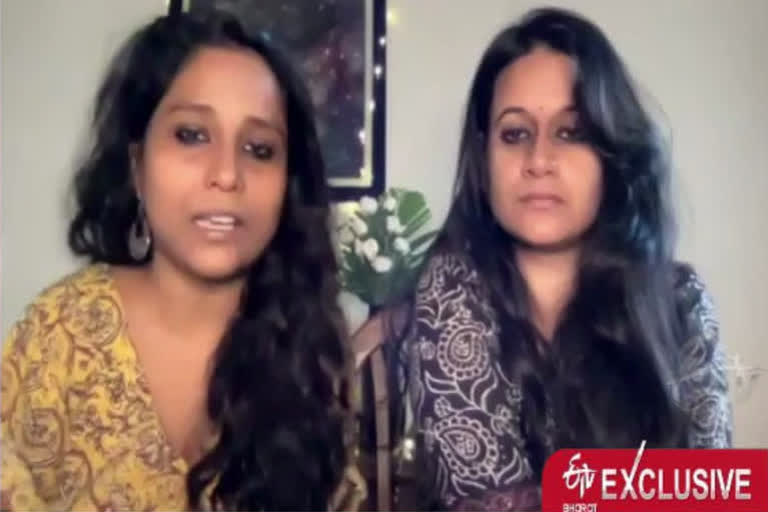Hyderabad: In an exclusive chat activists Natasha Narwal and Devangana Kalita spoke with ETV Bharat's Delhi State Head Vishal Suryakant explaining their ordeal faced as they were detained for almost a year in Delhi's Tihar jail. The duo who recently secured bail in the northeast Delhi violence case said that the law (UAPA) violates the basic structure of criminal justice which states 'you are innocent until proven guilty'. The Pinjra Tod activists say that even to this day they are unable to believe that it's all true.
Activist Narwal opened up about the harrowing experience that she had to face during her stay in Tihar. "It was a very shocking experience, before the arrest of Devangana, some other activists who were participating in the movement were also arrested. So I understood how things were happening. Getting arrested following an FIR, getting bail and the manner in which the allegations were made had impacted us. It took us several months to accept that reality. Even in jail, we used to see each other's face in disbelief as they were unable to comprehend that they were really in Tihar Jail under UAPA," Narwal said, adding that words cannot describe the pain that they had faced.
Read: Delhi northeast violence: Student activists released from Tihar on bail
Speaking about the arrest, Narwal revealed that her father was involved in many struggles and had been in jail for up to 6 months during the Emergency, and that hearing those stories from her father had helped her learn to fight and overcome all her struggles. The past year had been a true learning experience, especially given the condition of the jails.
"Actually, the jail system has been created only to snatch away a person's human rights. Whether your trial is completed or not, you are considered a criminal. We have to fight for basic things, and the victim is made to feel helpless and powerless. However, in our case, none could talk to us like they used to talk to other people. We had support, good legal representation. Though we faced violence in jail, personally we did not have to face much trouble," Narwal added.
Speaking about their legal team, Narwal said that though they were confident that they would get bail, UAPA is so stringent that it is hard to get bail and usually people only come out following acquittal, which is about 2%. There are even cases where people have seen the light of the day after 10 -15 years, she added, saying that they were prepared for the worst and that she had also spoken to her family on these issues. However, she thanked the Delhi High Court for having given such an order.
"Will thank the Delhi High Court a lot for giving such an order. There is a big difference between protest and sedition against the policies of the government. The High Court had also clarified regarding this in its judgment," Narwal said.
"As much as I have learned from my case, what I have read, I would not like to say that there should not be any law to deal with these things. But the basic rule of law in the criminal justice system is that you are innocent until proven guilty. You can't just talk about law from the technical point of view. We are seeing that people's lives pass for a long time due to the non-availability of bail. No one can make up for the time you have lost," Narwal added.
Read: Student activist says police suppressing his voice
When asked about the allegations against JNU students for indulging in anti-national activities, another student activist Devangana Kalita said if raising a voice against the government policies and ideology is termed as anti-national activities, then "it is very wicked that we are still following a law which was imposed during the colonial era."
"Recently, there were protests in JNU against a steep hike in college fees. Students come from diverse backgrounds. A hike in the fees would hamper the education of poor and female students who are already struggling with the financial and social stigma. I am a girl. I have been facing the social pressure of marriage. So, rising fees would hamper the students like us. Since education is a fundamental right, it should be accessible to all," Kalita told ETV Bharat.
Further, the activist noted that education should not be limited to 'career', rather it should focus on all aspects of life. "We are not getting an education just to build a career. We are getting education also to change society. If we will not talk about the social injustice that the Muslims, poor, Dalits and woman are facing, then who will?" added Kalita.
Elaborating about the Pinjra (Cage) tod movement, Kalita said that there are thousands of cages that oppressed women have to face. So, the basic principle of this movement is to break all these barriers and bring equal rights for all. "It is ironical that we had initiated a Pinjra tod movement in the college in order to break all those Pinjras which act as a hurdle for many of us, but unfortunately, we had landed in the biggest Pinjra," said Kalita attributing Pinjra as 'Tihar jail'."The movement will not stop. The struggle will continue," signed off Kalita after narrating her ordeal.
Delhi's Karkardooma Court had ordered the release of Pinjra Tod activists Natasha Narwal, Devangna Kalita and Jamia student Asif Iqbal Tanha in connection with the Unlawful Activities (Prevention) Act (UAPA) case of North East of Delhi Violence.
Read: HC bail verdict in Delhi riots sets 'dangerous precedent': Apex Court



